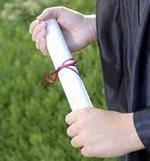VOA慢速英语 2008 1023a
时间:2019-01-11 作者:英语课 分类:VOA慢速英语2008(十)月
英语课
This is the VOA Special English Education Report.
This week, in part seven of our Foreign Student Series, we talk more about accreditation 1 of American colleges and universities.
To become accredited 2, programs have to meet quality standards that are set by an accrediting 3 agency. In the United States, private organizations around the country handle this process.
Schools must be reaccredited every ten years, or sooner. They can lose their accreditation if they have problems that are not corrected within a given period of time.
For example, the George Washington University Medical School announced last week that it was correcting problems found by its accrediting agency. The medical school in Washington, D.C., has been given two years to meet the standards. School officials said the changes include writing more detailed 4 course objectives and providing more study areas for students.
 The process of accreditation is designed in part to protect against "diploma mills." These operations call themselves colleges or universities but provide no real education.
The process of accreditation is designed in part to protect against "diploma mills." These operations call themselves colleges or universities but provide no real education.
In August, a husband and wife were sentenced to three years in federal prison in a case in the northwestern state of Washington. They operated Saint Regis University and more than one hundred other diploma mills. These businesses supplied worthless degrees to more than nine thousand people in the United States and around the world. The couple got seven million dollars.
George Gollin, a physics professor at the University of Illinois, is an expert on accreditation who helped investigate the case. He advises students to get the exact name of a school they are interested in, then look for it on the Web site of a group known as CHEA. CHEA is the Council for Higher Education Accreditation. The address is chea.org.
Make sure a school or program is accredited by a legally recognized accrediting agency before paying any money. Only legitimate 5 schools and programs are listed on the site. It also lists the only legally recognized agencies.
Experts advise students to be suspicious of offers from schools that do not require much work or interaction with teachers. One warning sign is any offer of college credit for "life experience."
And that's the VOA Special English Education Report, written by Nancy Steinbach. A link to the CHEA Web site can be found, along with our continuing Foreign Student Series, at voaspecialenglish.com. I'm Steve Ember.
This week, in part seven of our Foreign Student Series, we talk more about accreditation 1 of American colleges and universities.
To become accredited 2, programs have to meet quality standards that are set by an accrediting 3 agency. In the United States, private organizations around the country handle this process.
Schools must be reaccredited every ten years, or sooner. They can lose their accreditation if they have problems that are not corrected within a given period of time.
For example, the George Washington University Medical School announced last week that it was correcting problems found by its accrediting agency. The medical school in Washington, D.C., has been given two years to meet the standards. School officials said the changes include writing more detailed 4 course objectives and providing more study areas for students.
 The process of accreditation is designed in part to protect against "diploma mills." These operations call themselves colleges or universities but provide no real education.
The process of accreditation is designed in part to protect against "diploma mills." These operations call themselves colleges or universities but provide no real education. In August, a husband and wife were sentenced to three years in federal prison in a case in the northwestern state of Washington. They operated Saint Regis University and more than one hundred other diploma mills. These businesses supplied worthless degrees to more than nine thousand people in the United States and around the world. The couple got seven million dollars.
George Gollin, a physics professor at the University of Illinois, is an expert on accreditation who helped investigate the case. He advises students to get the exact name of a school they are interested in, then look for it on the Web site of a group known as CHEA. CHEA is the Council for Higher Education Accreditation. The address is chea.org.
Make sure a school or program is accredited by a legally recognized accrediting agency before paying any money. Only legitimate 5 schools and programs are listed on the site. It also lists the only legally recognized agencies.
Experts advise students to be suspicious of offers from schools that do not require much work or interaction with teachers. One warning sign is any offer of college credit for "life experience."
And that's the VOA Special English Education Report, written by Nancy Steinbach. A link to the CHEA Web site can be found, along with our continuing Foreign Student Series, at voaspecialenglish.com. I'm Steve Ember.
n.委派,信赖,鉴定合格
- a letter of accreditation 一份合格证明书
- This paper gives an overview of the Verification, Validation and Accreditation (VV&A) in High Level Architecture(HLA). 对基于高层体系结构(High Level Architecture,简称HLA)的仿真系统的校核、验证与确认(Verification, Validation and Accreditation,简称VV&A)问题进行了详细的介绍及分析。 来自互联网
adj.可接受的;可信任的;公认的;质量合格的v.相信( accredit的过去式和过去分词 );委托;委任;把…归结于
- The discovery of distillation is usually accredited to the Arabs of the 11th century. 通常认为,蒸馏法是阿拉伯人在11世纪发明的。
- Only accredited journalists were allowed entry. 只有正式认可的记者才获准入内。
v.相信( accredit的现在分词 );委托;委任;把…归结于
- One accrediting agency is the Council for Higher Education Accreditation. 有一个资信鉴定机构是为了高等教育的。 来自互联网
- One accrediting agency is Council for Higher Education Accreditation. 高等教育授权委员会就是这样一个授权机构。 来自互联网
adj.详细的,详尽的,极注意细节的,完全的
- He had made a detailed study of the terrain.他对地形作了缜密的研究。
- A detailed list of our publications is available on request.我们的出版物有一份详细的目录备索。
adj.合法的,合理的,合乎逻辑的;v.使合法
- Sickness is a legitimate reason for asking for leave.生病是请假的一个正当的理由。
- That's a perfectly legitimate fear.怀有这种恐惧完全在情理之中。